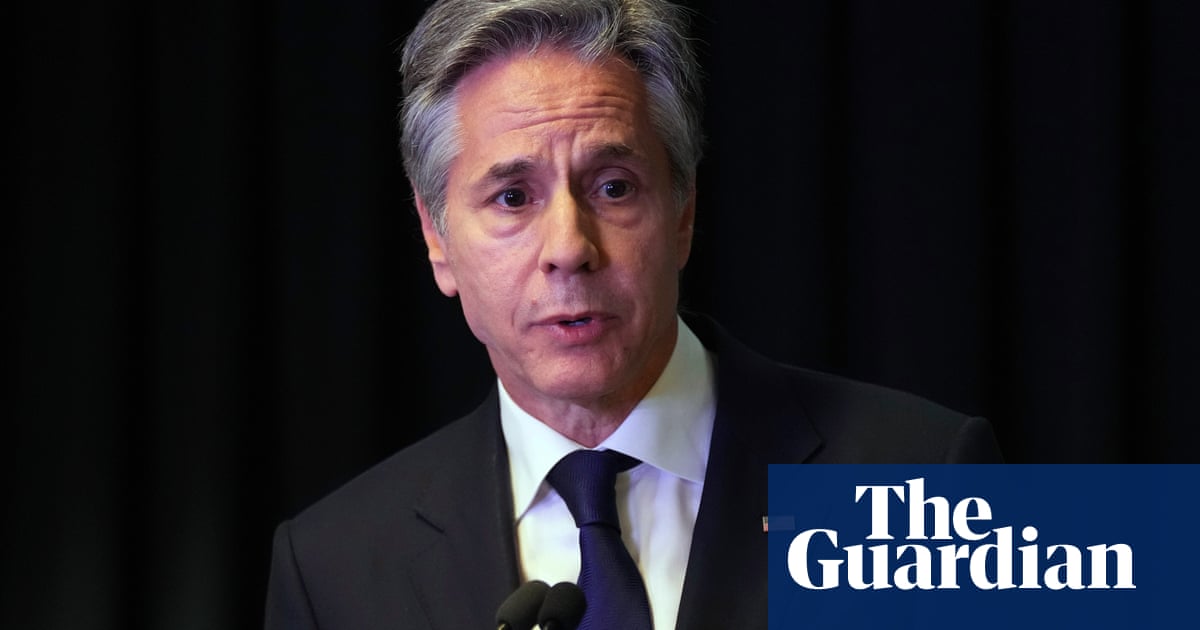
The US secretary of state, Antony Blinken, will travel to Saudi Arabia to try to restart fraught ceasefire negotiations between Hamas and Israel and discuss efforts to prevent spiralling regional conflict, while other senior US officials claimed Israel was willing to listen to their fears about a ground invasion of Gaza’s southernmost city.
A delegation from Hamas, expected in Cairo in parallel to Blinken’s visit, said they would provide a response to an Israeli proposal focused on an initial hostage release.
Pressure on international mediators has mounted to secure a swift deal, amid fears of a looming Israeli ground invasion of Rafah in southern Gaza, where over a million people are currently believed to be sheltering. The move risks sounding the death knell on talks to free hostages or find a diplomatic solution to end the conflict.
The White House national security spokesperson, John Kirby, said Israel was willing to listen to concerns about an invasion of Rafah. The US has previously said it was unwilling to support an Israeli attack on Rafah without a plan to protect civilians.
“They’ve assured us that they won’t go into Rafah until we’ve had a chance to really share our perspectives and our concerns with them,” Kirby told ABC News.
Blinken is due to arrive in Riyadh on Monday for diplomatic talks on the sidelines of the World Economic Forum, to discuss ceasefire negotiations and humanitarian assistance to Gaza.
He will also “emphasise the importance of preventing the conflict from spreading and discuss ongoing efforts to achieve lasting peace and security in the region, including through a pathway to an independent Palestinian state with security guarantees for Israel”, according to the state department.
Egyptian officials have stepped up their own efforts to mediate talks between Hamas and Israel, after a new proposal that would initially see a small number of hostages held in Gaza released in exchange for Palestinians in the territory to be able to return to their homes.
An Egyptian official told Associated Press that mediators were working on a compromise solution to answer both parties’ main concerns, intended to set the stage for further negotiations to end the war entirely.
The US news site Axios said Israeli officials were open to discussing the return of Palestinians to their homes in northern Gaza, and the withdrawal of Israeli troops from a central corridor that divides the enclave. Discussions around a “sustainable ceasefire” could take place in a second phase of negotiations, after an initial hostage release, it added.
Hamas took 250 people hostage on 7 October, when the group attacked towns and kibbutzim around Gaza in an unprecedented attack that killed 1,136. In the months since, Israeli bombardments of Gaza have killed an estimated 34,000 people and levelled most urban centres.
Intense negotiations mediated by Qatar and Egypt saw 105 hostages released in an initial deal last November. In the months since, Hamas said they were unwilling to compromise on the full withdrawal of Israeli troops from Gaza and a permanent ceasefire.
As Egypt stepped up mediation efforts, Majed al-Ansari, the Qatari foreign ministry spokesperson and adviser to the prime minister, gave a rare interview to the Israeli media outlet Haaretz discussing Doha’s continuing frustrations with the negotiations, indicating the chance of a swift deal could be remote.
“We were hoping to see more commitment and more seriousness on both sides,” he said. “We are, with the help of our international partners, hoping that we can pressure both sides to an agreement, but right now we are seeing from both sides a lot of lack of commitment to the process itself and to the mediation.”
Israeli attacks on sites in southern Lebanon have also risen, amid an increase in missile and drone attacks by the Lebanese militant group Hezbollah on Israeli territory, prompting fears of a regional escalation and causing alarm to international allies.
The French foreign minister, Stéphane Séjourné, began a visit to Lebanon on Sunday in an effort to cool tensions along its southern border. Séjourné recently issued a proposal that would see Hezbollah’s elite unit withdraw 6 miles from the demarcation line between Israel and Lebanon, if Israel agreed to halt strikes inside Lebanese territory.
In Riyadh, the Saudi Arabian foreign minister, Prince Faisal bin Farhan bin Abdullah, chaired a meeting with his counterparts from Jordan and Egypt as well as diplomats from Qatar, the UAE and the Palestinian Liberation Organisation to discuss a ceasefire in Gaza and efforts to achieve an independent Palestinian state.
The president of the Palestinian Authority, Mahmoud Abbas, warned in an address at the World Economic Forum that ground troops entering Rafah could cause mass displacement and “the biggest catastrophe in the Palestinian people’s history”.
“We call on the United States of America to ask Israel to not carry on the Rafah attack,” he said. “America is the only country able to prevent Israel from committing this crime.”
International pressure on mediators to secure a ceasefire deal in Gaza has risen as Israel forces say they are prepared to attack the southernmost city of Rafah with government approval. The Israel Defense Forces said its chief of staff, Lt Gen Herzi Halevi, had approved “plans for the continuation of the war” in a meeting with the head of the IDF’s southern command.
Israel’s far-right finance minister, Bezalel Smotrich, issued a message to the prime minister, Benjamin Netanyahu, calling the potential Egyptian ceasefire deal “humiliating surrender”.
Smotrich warned Netanyahu that declining to attack Rafah risked his withdrawal from the governing coalition, and the collapse of the government. “If you decide to raise a white flag and cancel the order to occupy Rafah immediately … the government headed by you will have no right to exist,” he said.